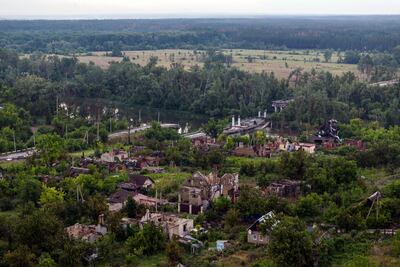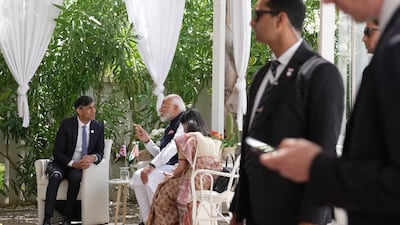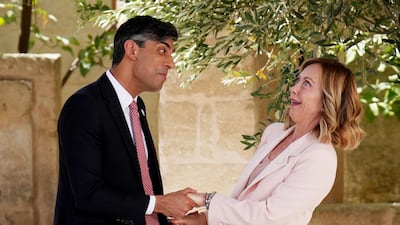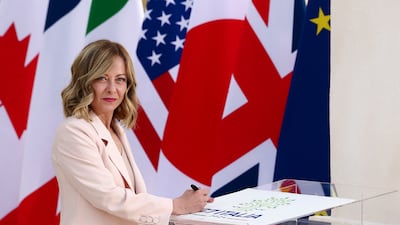Leaders of the Group of Seven nations meeting in Italy on Thursday agreed in principle to a $50 billion loan for Ukraine backed by frozen Russian assets, ordering officials at finance ministries to finalise the details in weeks.
Increasing support for war-torn Ukraine through the use of Russian frozen assets was a priority at the two-day G7 summit.
Ukrainian President Volodymyr Zelenskyy joined the G7 leaders for a special session on Thursday at the luxury Borgo Egnazia hotel resort on the Adriatic Sea.
“We have political agreement at the highest levels for this deal,” a senior US official said. “And it is $50 billion this year that will be committed to Ukraine.”
US President Joe Biden and Mr Zelenskyy also signed a 10-year bilateral security agreement on Thursday, aimed at bolstering Ukraine's defence against Russian invaders.
"Our goal is to strengthen Ukraine's credible defence and deterrence capabilities for the long term," Mr Biden said.
The EU's 27 countries in March adopted a plan to channel most windfall profits from frozen assets, mostly held in Belgium, towards a fund for military aid to Ukraine.
Profits are estimated at €3 billion ($3.24 billion) a year.
But Washington has been pushing the G7 to make more money available faster for Kyiv, European Council President Charles Michel said a few hours before the deal's confirmation.
The agreement on the loan, expected to be released to Ukraine by the end of the year, has raised questions about what would happen if the seized Russian state assets were released or did not generate as much profit as expected.

European diplomats have said the exact mechanism to guarantee these loans still needs work.
"All G7 are contributing to this loan. It is the windfall profits from the Russian immobilised assets in Europe that will serve it," European Commission President Ursula von der Leyen said.
"The finance ministers are now going through the details – for example, the topic of backstops that are necessary – and will clarify this as soon as possible."
The US official said Washington was willing to provide the entire $50 billion but said its contribution could be “significantly less” as it would be a shared initiative.
“We will not be the only lenders. This will be a loan syndicate. We're going to share the risk, because we have a shared commitment to get this done,” the official said.
But he would not say how much or even if the other G7 countries would contribute.
The US-Ukraine security pact includes a commitment by the US to work with Congress on a source of sustainable funding for the future.
Text of the agreement released by the White House also describes how the US will co-ordinate with Ukraine and other allies to make sure Ukraine has the military, intelligence and other means necessary to defend itself and deter Russian aggression.
The US and Ukraine would also consult “at the highest levels” in the event of a future armed attack by Russia against Ukraine.
New sanctions on Moscow
G7 countries increased pressure on Moscow this week, with the US on Wednesday expanding its sanctions on financial institutions considered to be supporting Russia's war economy.
The US also restricted the Russian military industrial base's ability to exploit certain US software and information technology services.
The UK followed with similar sanctions on Thursday, including taking aim at Moscow's main stock exchange.
Prime Minister Rishi Sunak said the UK “will always stand shoulder to shoulder with Ukraine in its fight for freedom”.

Among the new UK measures are its first sanctions on vessels in Russian President Vladimir Putin's so-called shadow fleet, used by the Kremlin to circumvent western curbs on its oil exports.
Sanctions are also aimed at suppliers of munitions, machine tools, microelectronics and logistics to Russia's military, Downing Street said.
Those suppliers include entities in China, Israel, Kyrgyzstan and Turkey, along with ships that carry military goods from North Korea to Russia.
G7 leaders also expressed their support of a US plan for a ceasefire in Gaza and said they were concerned about an escalation of tension at the Lebanese-Israeli border.
Meetings will be widened to some non-G7 leaders on the second day of the summit.
Guests including Pope Francis, Indian Prime Minister Narendra Modi and Brazilian President Luiz Inacio Lula da Silva will discuss artificial intelligence, energy and relations between Africa and the Mediterranean region.

























